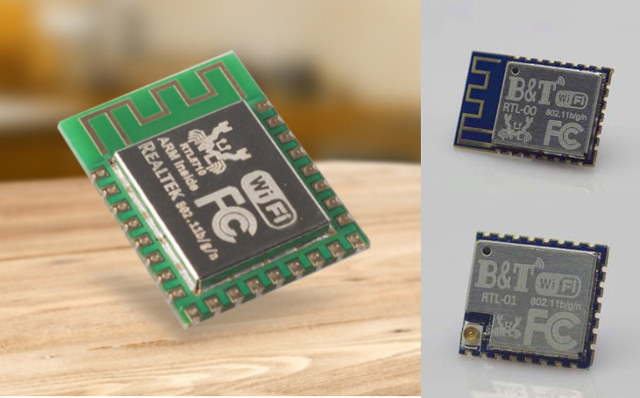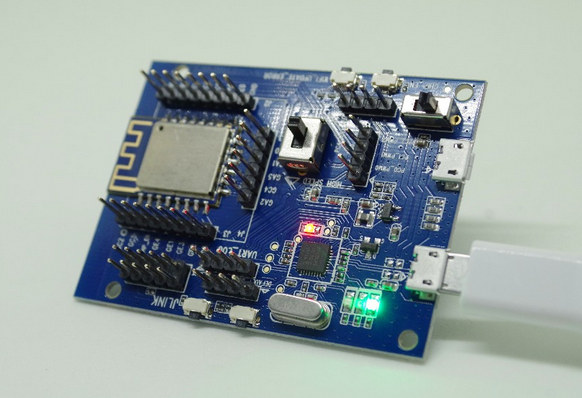ESP8266 WiFi modules initially stormed the maker market for IoT applications thanks to their low price, and later it became the dominant WiFi IoT platform for hobbyists thanks to its large community of developers. But technology progresses over time, and it’s always fun to look out for new solutions, and Realtek RTL8710 could prove to be an interesting alternative with its ARM Cortex-M3 processor @ 166 MHz, a little more user memory (48KB), audio support, faster WiFi performance, while still keeping a low price, as modules can be purchased for $3.90 on ICS station, a little more on eBay, and as low as $1.95 per unit on Aliexpress including shipping if you purchase 100 pieces or more.
 A Chinese website as a side-by-side comparison between Realtek RTL8710 and Espressif ESP8266, which I also found translated into English.
A Chinese website as a side-by-side comparison between Realtek RTL8710 and Espressif ESP8266, which I also found translated into English.
| Realtek RTL8710 | Espresif ESP8266 | |
| Package | QFN-48 (6×6 mm) | QFN-32 (5×5 mm) |
| CPU | ARM Cortex M3 @ 166 MHz | Tensilica LX106 @ 80 / 160 MHz |
| RAM | 48KB available to user | 36KB available to user |
| Flash | 1MB Built-in | 1, 2, 4, 8 or 16 MB |
| WiFi | 802.11n up to 150 Mbps, 802.11g up to 54 Mbps | 802.11n up to 65 Mbps, 802.11g up to 54 Mbps |
| GPIO | Up to 21 | Up to 17 |
| I2C | Up to 3 | Up to 1 |
| PCM | Up to 2 | None |
| PWM | Up to 4 | |
| UART | 2x high-speed UART, 1x low-speed UART | Up to 2x UART |
| Power | Voltage: 3.0 to 3.6V; Current: 80 mA | |
| Temperature range | -40 to 125 °C | |
| Standard certifications | FCC/CE/TELEC/SRRC/ WiFi Alliance | FCC/CE/TELEC/SRRC |
The processor is said to run FreeRTOS operating systems, which happens to be the one also used in Espressif ESP8266 and ESP32 SDKs. Boantong also provides a development board integrating their RTL-00 module with PCB antenna for $14 + shipping.

Debugging and programming can be done through the micro USB port using CMSIS DAP or JLINK. I’ve not been able to find RTL8710 SDK yet, but there does seem to be a dedicated support forum (in Chinese only).
So at this stage RTL8710 is clearly not for everyone yet, but if you are interested in using or evaluating RTL8710 modules in commercial projects, you may want to check out “Boantong IoT Business Department“.
Via Bird on SMEoT Facebook Group.

Jean-Luc started CNX Software in 2010 as a part-time endeavor, before quitting his job as a software engineering manager, and starting to write daily news, and reviews full time later in 2011.
Support CNX Software! Donate via cryptocurrencies, become a Patron on Patreon, or purchase goods on Amazon or Aliexpress





if your are looking for english official support forum, i think it’s here http://www.amebaiot.com . it is RTL8195though. but i think it’s totally compaatible.
Looking good for applications where you prefer power instead of battery life 🙂
I’d love to know if these modules have USB device capability as part of their ARM core. Opens up such possibilities!
Now only if this gets integrated into the Arduino UI . . .
There are also the AI6060H, who claim to be better than the ESP8266.
Development Board, with module and USB/Serial costs U$4.02:
http://www.aliexpress.com/store/product/Wireless-WiFi-IoT-Development-Board-based-on-AI6060H-from-ACSIP-Module-Better-Than-ESP8266-Development-Board/1912455_32675960901.html
Can you add ESP32 to the comparison chart?
Even if ESP32 is not available yet it would still be interesting to compare the spec.
@Harley
I have this comparison table between ESP32 and ESP8266 -> http://www.cnx-software.com/2016/03/25/esp8266-and-esp32-differences-in-one-single-table/, but some rows are missing to add ESP32 to the table above, and some are not comparable (e.g. RAM available to user vs total RAM).
@Freire
Interesting.
Link to some documentation @ http://bbs.smartarduino.com/showthread.php?tid=2045
Some code @ https://github.com/greatlevi/AI6060H
It’s unclear how it’s better than ESP8266 though.
Well, better specs do not mean better Product, so many Slow Arduino s out there because they just work so easyly
@Rogan Dawes
Yes there are more parts in this device family that have USB.
FYR. IRC channel #rtl8710 has been created.
There is a real English forum online http://www.rtl8710forum.com. I hope this will become a nice community with lot’s of information about the chip.
sdk is here:
https://drive.google.com/file/d/0B4XlaJgRvCfteUM3aF9iY3FHMWM/view
@zoobab
That’s the ameba SDK, is it for RTL8710 or RTL8185?
I have a different SDK @ http://pan.baidu.com/share/link?shareid=3336444182&uk=1429200511 password: brwp
and possibly another one @ https://drive.google.com/file/d/0B7hSaaRNzvZnaWRmcG9FeEZfWUU/view?usp=drive_web
@cnxsoft
The baidu link only points to a “software bundle” including (a most certainly pirated version of) IAR and some other (also pirated?) tools (JLink server?, serial console?). There is not a single .c source file in the .zip file. Unfortunately this is completely useless.
The first google drive link points to the “official” ameba sdk for their dev board (RTL8195A) and I think it won’t do anything with a RTL8710 although there are a few “#if defined CONFIG_PLATFORM_8711B” here and there but the big part, that I would expect in “/component/soc/realtek/8710”, is (unfortunately) missing.
@rizzir
I finally got access to the second Google Drive link, and that’s basically the same as the Baidu link.
@Daan
Hi, daan. thanks for you work. This comment is from official. I will forward your forum to other Ameba (rtl8195AM, rtl8711AM, rtl8711AF and rtl8710AF) users.
@cnxsoft
Hi, you can get the newest SDK on our official page that all Ameba serial (rtl8195, rtl8711 and rtl8710) compatible: http://www.amebaiot.com.en
New conflicting information: https://rtl8710forum.com/viewtopic.php?f=3&t=5&p=16#p14
RTL8710 appears to be limited to 83MHz, and lacks PCM interface.
Which network?
@Harley
A better comparison would be the ESP8285 which is the successor to the ESP8266, the ESP32 is a bigger and more expensive chip for a different class of product.
It is true that in the past 4 years, the ESP8266 is the most popular Wifi solution for Makers, the good spec and cheap price make the competitors, such as RTL8710, hard to grow up.
But sometimes plan B is indeed needed. Recently the W600 Arm SoC Wifi solution, released by Winner Micro, I think would be an evenly matched competitor for ESP8266.